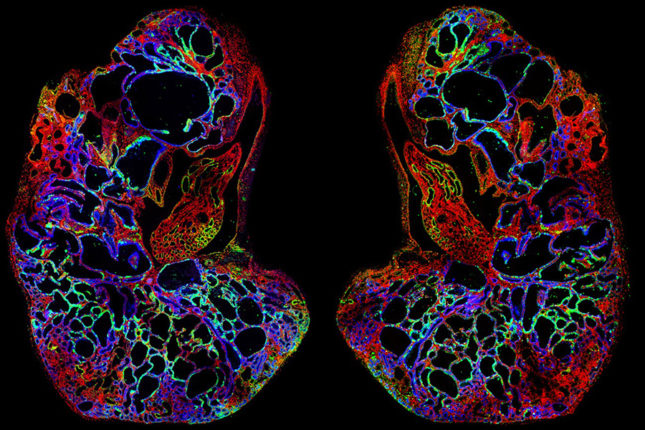
Moe Mahjoub, PhD
Assistant Professor of Medicine Moe Mahjoub, PhD, discovered that, yes, there can be “too much of a good thing.”
Dr. Mahjoub’s new study, published in the July issue of the Journal of Cell Biology, found that formation of excess centrosomes is detrimental to renal development and is sufficient to trigger cyst formation independently of cystic gene mutations.
Renal cells typically have a single centrosome and cilium, essential components of the microtubule cytoskeleton that act together to regulate the activity of several developmental signaling pathways. During cell proliferation, dysregulation of centrosome biogenesis can result in centrosome amplification (CA), producing multiple centrosomes per cell.
CA has been reported in malignant lesions in a variety of tissues and was recently shown to be a feature of cystic kidney disease, a well-established ciliopathy resulting from ciliary dysfunction.
In a previous, landmark study, Dr. Mahjoub found that CA was detrimental to ciliary signaling and function. “Based on our in vitro studies, we hypothesized that CA might play a prominent role in the pathogenesis of ciliopathies, and, more specifically, that CA itself may be a cellular defect that promotes or drives cystogenesis in the kidney,” says Mahjoub.

Members of the Mahjoub Lab, left to right: Rashmi Nanjundappa, Lai Kuan Dionne (who recently left the lab), Tao Cheng and Kyuhwan Shim.
In the present study, the research team examined the consequences of CA in the developing embryonic kidney, and in the adult kidney during homeostasis and after injury.
They found that increasing centrosome number disrupted cell proliferation and differentiation in the developing kidney, resulting in hypoplastic kidneys. Importantly, CA induced rapid cyst growth and expansion shortly after birth. In the adult kidney, induction of CA caused ciliogenesis defects, but not cyst formation per se. However, the study found that CA “sensitized” these kidneys in adult mice, in that ischemic renal injury induced cystogenesis.
This was the first demonstration that CA is sufficient to cause a ciliopathy phenotype in vivo.

Dr. Mahjoub notes, “Most of the studies regarding the consequences of CA have been focused on cancer (solid tumors), since it is well established that CA can induce genome instability and drive cell transformation. What our study shows is that we have to think about CA in human diseases other than cancer, specifically disorders caused by defective ciliary function.”
Future studies in the Mahjoub laboratory will test whether targeting cells with CA could be a useful approach as a new therapeutic treatment of cystic diseases of the kidney.
See here for the full article titled Centrosome Amplification Disrupts Renal Development and Causes Cystogenesis. Authors: Dionne LK, Shim K, Hoshi M, Cheng T, Wang J, Marthiens V, Knoten A, Basto R, Jain S, Mahjoub MR.
Visit Dr. Mahjoub’s website and follow him on Twitter @MahjoubLab.